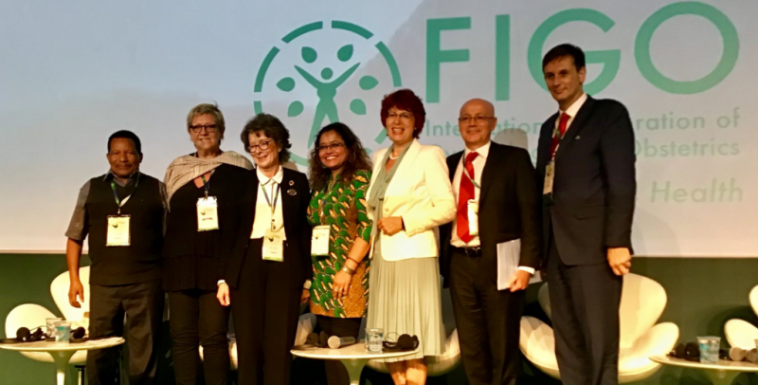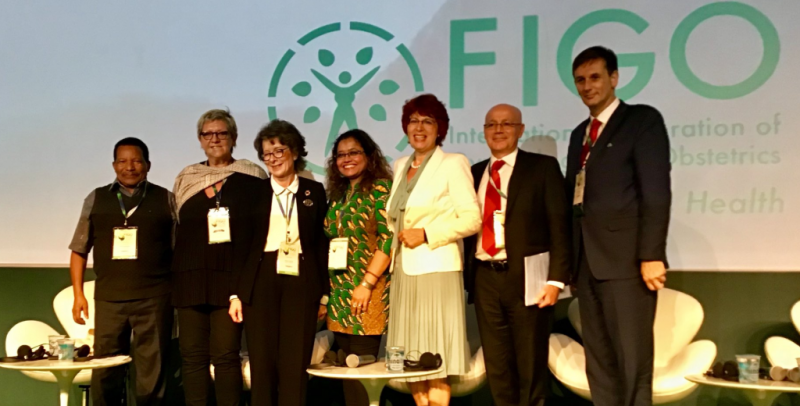FIGO 2018 through the SDGs lens
“Don’t underestimate your power, and be persistent” Lesley Regan reminded the audience attending FIGO World Congress in Rio last week as she opened the panel session on 'FIGO 2018 through the SDGs lens'.


We are now almost at the end of year 3 of the Global Goals, and FIGO’s one million members are already contributing to ensuring healthy lives and promoting wellbeing for all people (SDG3) as well as empowering women and girls (SDG5) in their own communities.
This week, when almost 11,000 people have come together in Rio, we have seen numerous powerful voices who have highlighted the importance of ensuring women and girls raise their voices when it comes to their health; sexual and reproductive health, access to modern contraception, ending violence against women and addressing FGM.
In playing a UN video Prof. Regan reminded the audience that under the MDGs extreme poverty was halved, maternal mortality was reduced by 44% and highlighted that we simply cannot stop half way.
Guttmacher Institute reports that twenty-three million girls aged 15 to 19 years in developing regions have an unmet need for modern contraception and that ‘every year an estimated 21 million girls aged 15 to 19 years and 2 million girls aged under 15 years become pregnant'.
Every one of these girls is therefore unlikely to complete her education, making it harder for her to find work, making her more dependant and often more vulnerable to sexual violence and abuse; having an impact upon her health and wellbeing for the rest of her life.
Preventing unintended pregnancies and reducing adolescent childbearing through universal access to sexual and reproductive health care is a core aspect of SDG3. The panel was asked what are your three tips for leveraging collaboration amongst FIGO’s 132 member societies, midwives, nurses, WHO and UN on behalf of girls and women?
Dr A. Metin Gülmezoglu from the HRP Research team at WHO stated
Think big, start small and start now
While Flavia Bustreo, former Assistant Director General - Family, Women's and Children's Health highlighted:
Provide data, be present at for a where the decisions are taken, influence the financing for women’s health, focus on the social and environmental determinants of health, these are the steps that we need to take to strengthen partnerships to promote SDG3 and SDG5.
Listening to women themselves, and leveraging their authentic voices at the global level is also necessary. The participation of women allows decision makers, at both national and global levels, to tap into unique perspectives and experiences, this brings a better understanding of women’s needs and subsequently leads to better decisions and policies.
FIGO Chief Executive Johan Vos stated:
FIGO is in official relations with WHO. This allows us the opportunity to be at the table when the World Health Assembly meets and to invite our member societies to speak up themselves from the heart and bring these issues from our countries at the forefront.
The WHO’s Global Accelerated Action for the Health of Adolescents (AA-HA!) highlights that “Investments in adolescent health bring a triple dividend of benefits for adolescents now, for their future adult lives, and for the next generation. Their health and well-being are engines of change in the drive to create healthier, more sustainable societies”.
We all have a role to play. By working in partnership, and striving towards FIGO’s vision that women of the world achieve the highest possible standards of physical, mental, reproductive and sexual health and wellbeing throughout their lives, we are also progressing towards meeting the SDGs.
It’s only the end of year three, let’s not stop now.
This news item has been contributed by:
Jennifer Crago
Director, Communications, Advocacy and Publications, FIGO